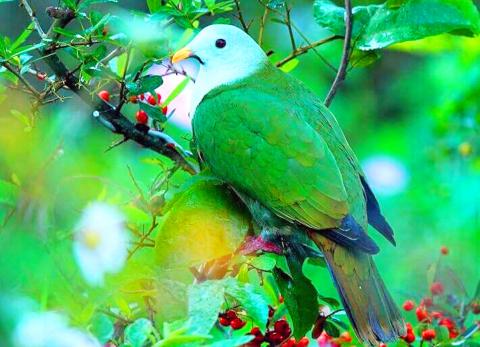Unusually high numbers the rare black-chinned fruit doves have been spotted at Siaobantien Recreational Farm in Nantou County’s Lugu Township (鹿谷), birdwatchers said.
The black-chinned fruit dove (Ptilinopus leclancheri) is a colorful and small bird so rare that one birdwatcher described the sightings as an event that could happen “once in 100 years,” attracting many enthusiasts and photographers to the farm.
According to the Council of Agriculture’s Taiwan Endemic Species Research Institute, an adult black-chinned fruit dove can reach a length of 28cm, with white feathers on its head and neck, green feathers on its torso and wings, and a characteristic black streak on its chin.

Photo: Courtesy of Nantou County Councilor Hsu Su-hsia
A reclusive bird that usually stays away even from its own kind, the black-chinned fruit dove is rarely observed out of its habitats, which are the middle and low-altitude forests south of Chiayi, and had never been seen at Siaobantien Recreational Farm, the institute said.
The sightings in Nantou are made all the rarer by the fact that in the past 30 years, the number of documented sightings of the bird is estimated at about a dozen, it said.
It is likely that the birds were attracted by the red fruits of the Formosan firethorn in Lugu, which attract birds, as the fruit shines under the sun, the institute said.
Experts said they did not not know whether the black-chinned doves have flocked to the area in search of food or if they have taken up permanent residence in Nantou.
The Formosan firethorn is a hardy evergreen shrub that grows in the sandy riverbeds of Hualien and Taitung.
Officials have been trying to encourage growing firethorn shrubs, a policy that the presence of the black-chinned fruit doves proved to be beneficial, Lugu residents said.

Taipei has once again made it to the top 100 in Oxford Economics’ Global Cities Index 2025 report, moving up five places from last year to 60. The annual index, which was published last month, evaluated 1,000 of the most populated metropolises based on five indices — economics, human capital, quality of life, environment and governance. New York maintained its top spot this year, placing first in the economics index thanks to the strength of its vibrant financial industry and economic stability. Taipei ranked 263rd in economics, 44th in human capital, 15th in quality of life, 284th for environment and 75th in governance,

The Sports Administration yesterday demanded an apology from the national table tennis association for barring 17-year-old Yeh Yi-tian (葉伊恬) from competing in the upcoming World Table Tennis (WTT) United States Smash tournament in Las Vegas this July. The sports agency said in a statement that the Chinese Taipei Table Tennis Association (CTTTA) must explain to the public why it withdrew Yeh from the WTT tournament in Las Vegas. The sports agency said it contacted the association to express its disapproval of the decision-making process after receiving a complaint from Yeh’s coach, Chuang

Control Yuan Secretary-General Lee Chun-yi (李俊俋) tendered his resignation last night, admitting that he had misused a government vehicle, as reported by media. His resignation was immediately accepted by the Control Yuan. In a statement explaining why he had resigned, Lee apologized for using a Control Yuan vehicle to transport his dog to a pet grooming salon on May 20. The issue first came to light late last month, when TVBS News reported that Lee had instructed his driver to take the dog to the salon. The news channel broadcast photos that it said were taken by an unnamed whistle-blower, which purportedly showed the

A former officer in China’s People’s Liberation Army (PLA) who witnessed the aftermath of the 1989 Tiananmen Square massacre has warned that Taiwan could face a similar fate if China attempts to unify the country by force. Li Xiaoming (李曉明), who was deployed to Beijing as a junior officer during the crackdown, said Taiwanese people should study the massacre carefully, because it offers a glimpse of what Beijing is willing to do to suppress dissent. “What happened in Tiananmen Square could happen in Taiwan too,” Li told CNA in a May 22 interview, ahead of the massacre’s 36th anniversary. “If Taiwanese students or